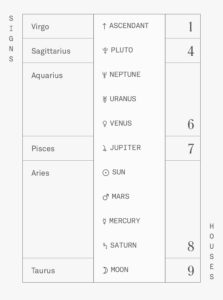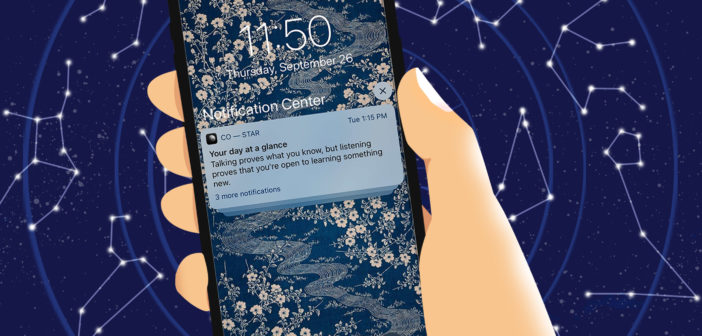Scorpio sun Banu Guler’s mission was clear when she first developed the astrology app Co-Star back in 2017, according to Vanity Fair. Along with co-founders Anna Kopp and Ben Weitzman, Guler wanted to create a platform that delivered the dreamy and pensive horoscopes from the magazines of their youth directly to the screens of fellow starry-eyed believers.
“Everyone wants to believe in something,” said Sagittarius Claire Hartman, ’20. “Not that the stars control us or anything. But I think people want to believe that there is some sort of path that they’re on or a guiding force in their life.”
Each of the app’s creators were living in New York at the time — a city where astrology and fortunetelling were unavoidable for years. Even in pop culture, there was Charlotte from “Sex And The City” going to a Tarot card reader on the Upper West Side at the tail end of a messy marriage and Brooklyn native Nas’s song “Virgo.” The point was, Guler, Kopp and Weitzman collectively tapped into a familiar interest in their own backyard.
What’s more, insists Guler, the talk of Co-Star is still abundant in the borough where it was born.
“Go to any of the sort of hip bars in Brooklyn right now,” Guler told Kenzie Bryant of Vanity Fair. “You will invariably overhear groups of people downloading and talking about Co-Star.”
Origin and appeal
Astrology for adults isn’t new, though. According to Pew Research, approximately 25% of the American public engage with their star readings. But young people especially, dating back to the late 1970s in Robert Wuthnow’s “Astrology and Marginality,” are more commonly astrology consumers. Wuthnow describes young people as “rational,” yet entirely skeptical of mainstream means of disseminating information.
“I think Co-Star is kind of ruthless,” said Gemini, Claire Nelson, ’21. “I think sometimes that it’ll just rip you to shreds and (young people) think that’s hilarious and fun.”
According to its website, Co-Star uses “NASA data” and their own patented technology to produce highly individualized predictions and insights. Users enter their birthplace and time. Then, after a swift loading period, the app creates their complete birth chart. It includes their sun, moon and ascendant (rising) signs, each carefully explained.

A birth chart
“You go on Snapchat, and you see the Snapchat horoscope things, and they’re so, tacky and Co-Star, when I downloaded it, it looked so professional,” said Hartman.
In those first few honeymoon months, Hartman would routinely check in with the app at night right before she fell asleep. She wanted to know what Co-Star got right, if any of what had taken place that day happened for a reason. Still, Hartman likes to think that she takes every message with a healthy grain of salt.
“I found myself going back to it when I was looking for answers about something happening in my life,” said Hartman. “But honestly, it’s probably just a coincidence when that lines up.”
Each day, the Co-Star push notifications, aptly called “days at a glance,” seem like a direct call to the user, although they are strategically ambiguous. It’s as if the brief messages’ purpose is to remind the person that they’re alive, and if they’re not seizing the day, then the day itself is ostensibly not happening at all.
“What’s nice about the way horoscopes are written to us, often in sort of vague and broad language, goes back to that confirmation bias,” said Professor of Psychology and Neuroscience Jon Mueller, Aquarius. “That means we’re able to read into them what we want to read into them; we’re able to see what we want to see.”
Sometimes, the “days at a glance” are overly optimistic. Other times, they read rather menacing. The intended audience is, perhaps, suspicious of both. Maybe that’s the point — to consider the stars but never to trust them implicitly.
“We’re just wired to want to explain our world and make sense of it,” said Mueller. “So, anything that gives us any clue as to why something might be happening, we tend to look for that.”
Mostly, though, the messages are intended to speak to you directly, which, depending on the content, can be dizzying.
“If it says, ‘trouble in everything,’ you might not think that’s going to impact you, but it probably impacts your unconscious,” said Hartman. “And that might make you secretly, back there somewhere, think that, ‘I’m going to have a bad day, and everything’s going to go wrong.’”

A power, pressure and trouble prediction.
Influence
Nelson has had Co-Star on her phone since early last year. That summer, she told all of her friends about this tragically cool app that seemed to know more about her than she did. Nelson said that every astrology believer, no matter how devoted, is very deliberate in how they associate and align themselves with their given signs.
“As much as I buy into Co-Star, and I definitely buy into that, your signs have some validity, I think your sign means to you as much you let it,” said Nelson.
The characteristics associated with Nelson’s sign are specific — outgoing, impulsive, highly intelligent, adaptable, etc. But she feels that she identifies with her fellow Geminis in equally distinct and sentimental ways.
“I’ve always made friends really easily, Geminis, that’s kind of what they do. I have two different personalities with my mom and with my dad, that’s super Gemini of me,” said Nelson. “But there are things that I don’t identify with, and I just go: ‘That’s not me!’”
I’m an Aries sun, a fire sign. When I first downloaded the app last year, I didn’t really understand what that meant. But when I was a kid, I read my horoscopes from the Toronto Star like they were breaking news. I guess they were, to some degree, news to me, even if I couldn’t trust them completely.
I suppose that there was a certain kind of comfort in feeling like I wasn’t always in control of the things that were happening to me and around me. Did I really believe that the stars were constantly pulling the strings of my teen and tweenage life? I don’t think so, but I liked to think that they had a hand in some of it. Maybe the bad wasn’t all my fault and the good was sort of fate. Hopefully, the universe was looking out for me in ways that I didn’t always understand.
But when I started receiving the Co-Star push notifications as an adult, they were different than the lengthy fortunes I’d cling to when I was younger. They could be aggressive and a bit wicked. “Handle your shit,” it once read, or “No one cares how many books you’ve read.” I couldn’t decide if they were helping me or hurting me, if they were motivating me or simply pushing me out further into a galaxy of my own worst fears and insecurities.

A “day at a glance” notification.
Because no matter how I felt prior to opening the app, they still made sense to me. They could always apply.
Still, I couldn’t bring myself to turn the notifications off or delete the app altogether. I’d be slightly on edge when the app forecasted “trouble” in self, work, thinking and creativity or “pressure” in love or my social life, and I was embarrassed to admit it aloud. But I’d obsessively check back every day until the stormy period had passed.
“We’re young. We don’t know anything,” said Nelson. “Sometimes, everything feels out of control, and I know, for me, I’ll look at Co-Star and be like, ‘oh my god, yes, I am experiencing trouble with work.’ Like, something’s telling me that’s valid.”
I started with just waiting for the notifications to ping on my phone. But before long, I was actively looking for my “days at a glance” and the rest of my updates as soon as I could. Those first several months, I’d wake up, check Co-Star, fall into a bit of a spiral and wonder what was real.
I suddenly had these distorted expectations. It felt like someone was spying on me, noticing patterns in my behavior and then delivering me messages based on that information. Was I just too vulnerable and panicky for this new technology? How could an app know me so well? Or was I just forcing myself to believe that it did?
“As far as the predictions are concerned, yeah, things are going to happen that aren’t those predictions,” said Nelson. “And then you’re going be bummed. You just have to know that life is not predictable.”
I have since stopped freaking out at every notification but still refuse to shut them off. If the “days at a glance” seem out of line, I handle it more gracefully — like an Olympian that just missed the podium, waving to the audience before they go on with the rest of their lives.
The messages don’t affect me in the same way, like those fleeting months where I was my own worst enemy. I still like letting the universe whisper things to me via horoscopes or Co-Star — things that only I’m supposed to know.
“If the moon can affect the tide, why can’t the moon affect the 70% of water that we’re made up of?” said Nelson.

